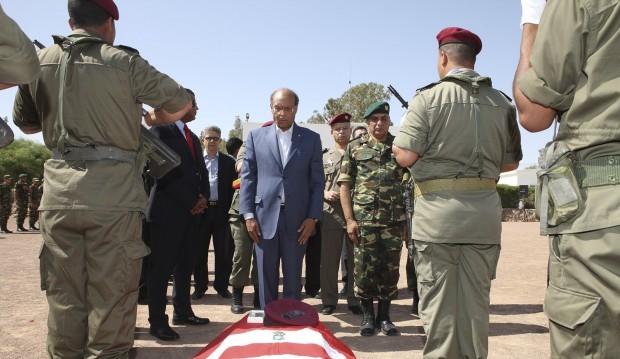
In this image provided by the TAP (Tunis Afrique Presse), Tunisian president Moncef Marzouki, center, pays respects by the coffin of a soldier during a ceremony on Tuesday, July 30, 2013, in Kasserine. (AP Photo/Ali Louati, TAP)
Tunis, Asharq Al-Awsat—Tunisian Constituent Assembly speaker Mustapha Ben Jafar ordered the parliamentary body’s suspension beginning from Thursday, against the backdrop of the political and security crises engulfing the country.
Political parties and leaders are calling for an urgent review of the Tunisian government’s makeup following a spate of political assassinations and terrorist attacks in the country. The security crisis intensified following the murder of secularist politician Mohamed Brahmi on July 25; he was reportedly killed with the same gun that had earlier killed secular leader Chokri Belaid. The Islamist-led government has come under increased criticisms for its failure to promote national security in post-revolutionary Tunisia.
Following the country’s first free elections in October 2011, Tunisia has been led by a political troika consisting of the Islamist Ennahda Movement, along with the secularist Congress for the Republic (CPR) and the Democratic Forum for Labor and Liberties (FDTL). This troika has come under increasing pressure to expand its political base in recent weeks.
Tunisia’s education minister, Salem Labyedh, announced his resignation in protest against the assassination of Brahmi, putting further pressure on the under-fire Islamist-led government.
Tunisian culture minister Mehdi Mabrouk told local media he was hoping to convince all ministers to resign.
“I hope to see the resignation of all members of the government in the coming days,” he told the local Shems radio station.
“I hope these will be the last days I spend as the minister of culture,” he added.
Imad Daymi, the secretary-general of the CPR, informed Asharq Al-Awsat that his party supports a government review and the formation of a new national unity government.
However, Daymi completely rejected demands for the dissolution of the Constituent Assembly, describing this as the only democratically elected constitutional body in Tunisia. He stressed that it is the assembly’s duty to ensure a smooth democratic transition, as well as to draw up a new constitution.
For its part, the FDTL threatened to withdraw from the government and the troika altogether in the event that the Ennahda Movement and the CPR rejected calls to form a national unity government.
The ruling Ennahda Movement lately announced it would seek to “expand the political base of rule” in an attempt to defuse the crisis gripping the country, but rejected the “exploitation of crime to stage a coup against legitimacy.”
In an official statement, Ennahda announced: “We emphasize the importance of consensus and the necessity of dialogue within the framework of adhering to the objectives of the revolution and the foundations of the civilian and democratic state,” adding, “We call for the creation of a broad national coalition to complete the achievement of the objectives of the revolution and the tasks of the democratic transition.”
The political maneuvering in Tunisia is taking place against the backdrop of an escalating security crisis. A bombing targeted a National Guard patrol early Thursday in Al-Muhamadyah district to the south of Tunis, but no casualties were reported.
Eight Tunisian military personnel were killed and three injured following clashes with gunmen near Mount Chaambi earlier this week.
In an exclusive statement to Asharq Al-Awsat, defense ministry spokesman Brig. Gen. Tawfik Al-Rahmouni emphasized that the military institution in Tunisia “is well aware that confronting terrorism has a price and requires sacrifice, patience, and persistence.”
“The national military forces of Tunisia will spare no effort to defend the stability of Tunisia and the security of its people,” he added.
Rahmouni confirmed that eight Tunisian soldiers had been killed in an ambush, adding that some of their corpses had been mutilated by the unknown assailants.
Asked who was responsible for the attack, the defense ministry spokesman told Asharq Al-Awsat: “We do not want to jump to conclusions; investigations are still under way to determine the number of the gunmen, their nationality and which side they belong to.”
As for whether these gunmen are new arrivals to Mount Chaambi or have been present there for a while, Brigadier General Rahmouni said: “Both hypotheses are on the table and this is what the current investigations will demonstrate,” adding, “we will continue to comb and monitor the [mountain] to thwart [attempts] to threaten the stability of Tunisia and the security of its people.”
A funeral was held on Tuesday in the Qasrayn barracks which was attended by President Marzouki and members of the government, as well as senior officials from the Tunisian military.
In a speech at the funeral, Marzouki called on the country’s political sides to stop fighting and respond to the needs of the public, as well as seek to preserve national unity and refrain from spreading discord.
“We will continue to work to defeat terrorist gangs and we are confident we will beat them,” Marzouki said.
Security sources informed Asharq Al-Awsat that the terrorist group that carried out the recent attack in Mount Chaambi could be linked to Kamal Bin Arabaya, a terrorist leader recently arrested in Algeria.
